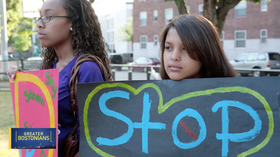It’s quite a journey from the streets of Dorchester to the corporate suites Downtown.
And one woman who has traveled that path is using her executive skills in an effort to end urban violence.
If you want to get a sense of how many lives are touched by street violence in Boston, take a look. Each one of these teenagers has lost someone.
Seventeen-year-old Tyleke Curry wears a button with the image of that friend, sixteen-year-old Jonathan Dos Santos, murdered while riding his bike.
“I don’t want violence on the streets no more because I don’t want somebody else to go thru the same thing I’m going through,” said Curry.
Tyleke, and his friend Darren Brown, come from neighborhoods where it’s often easier to join a gang than avoid one. But listen to what they want to do:
“We want to be the friends that take our friends out of the streets,” said Brown.
They are learning, along with dozens of other teens, how to be leaders.
Foot soldiers in a battle against violence, led by Monalisa Smith.
“We have to get each community member, each mother, each youth to say that I am more than what’s around me,” said Smith.
A Dorchester native, Monalisa sees community organizing as not so much a choice but her destiny. She had built a career, three decades, as a bank executive when five years ago her eighteen-year-old nephew, Eric, was murdered.

“When you lose someone, you know, to senseless violence, it does something to your family, it’s like there’s this missing seat at the table all the time,” said Smith. “I had to make a decision, was I going to have, you know, his life end on that pavement that night or was I going to be able to move forward and make a difference in the midst of this tragedy?”
She left banking and began “Mothers for Justice and Equality”. Many of the mothers she has organized have lost children, all offer support but this group is about changing the status quo.
“This is a strategic plan to end violence in a way that’s never been done before,” said Smith. “People will ask, ‘well how do you plan to do that? How can you take up the cause of ending violence when violence has been with us for so long?’ Because, we go to the root causes of violence.”
And that includes going someplace you might think women who have lost children to violence would avoid, prison. But Monalisa and her fellow ‘mothers’ are regulars here at the South Bay House of Correction.
This is a financial literacy class. But Monalisa says it’s also a lesson in values, in helping inmates figure out what matters most, how to make a life when they’re released.
“So when they come back they’re humanized and they have this interaction with mothers for justice and equality and they come back to us not just feeling they’re connection with a human being, but also understanding how life happens for me outside of those walls,” said Smith.
She calls the prison work “intervention,” youth work “prevention,” and she calls on mothers to take charge.
“Go in the room, search the room for a gun, search for whatever you need to look for and don’t feel like you’re invading their privacy. They don’t have any privacy it’s your house,” said Smith.
Like any experienced executive, Monalisa has a vision: to end violence. Mothers and their children, she says will make it happen.

